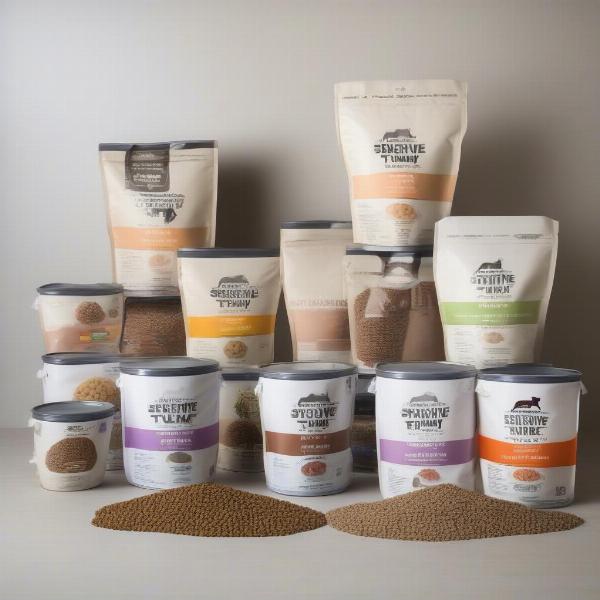Choosing the right food for a dog with a sensitive stomach can be challenging. Sensitive tummy dog food is specifically formulated to be gentle on the digestive system, minimizing the risk of upset stomachs, vomiting, and diarrhea. This guide explores everything you need to know about sensitive tummy dog food, from identifying the signs of a sensitive stomach to selecting the best food for your furry friend.
Understanding Your Dog’s Sensitive Stomach
Several factors can contribute to a sensitive stomach in dogs. Food allergies or intolerances are common culprits, with ingredients like beef, chicken, dairy, and wheat often causing problems. Other factors include stress, changes in diet, infections, inflammatory bowel disease (IBD), and pancreatitis. Identifying the underlying cause is crucial for effective management. Signs your dog might have a sensitive stomach include frequent vomiting, diarrhea, gas, bloating, decreased appetite, and itchy skin or coat.
Key Ingredients in Sensitive Tummy Dog Food
Sensitive tummy dog foods are typically formulated with easily digestible proteins and carbohydrates. Look for limited ingredient diets featuring novel proteins like lamb, salmon, or venison, as these are less likely to trigger allergic reactions. Hydrolyzed proteins are also a good choice, as they are broken down into smaller pieces that are easier for the digestive system to process. Avoid foods containing artificial colors, flavors, and preservatives, as these can irritate the gut. Beneficial ingredients to look for include prebiotics and probiotics, which support healthy gut flora, and omega-3 fatty acids for their anti-inflammatory properties.
Choosing the Right Sensitive Tummy Dog Food for Your Dog
 Choosing the Right Dog Food
Choosing the Right Dog Food
When selecting sensitive tummy dog food, consider your dog’s age, breed, size, and activity level. Puppies, adults, and senior dogs have different nutritional needs. best dog food for sensitive stomach uk offers a range of options tailored to specific life stages. If your dog has any other health conditions, consult with your veterinarian for personalized recommendations. Introduce new food gradually to avoid further digestive upset. Start by mixing a small amount of the new food with your dog’s current food and slowly increase the proportion over several days.
What if My Dog Still Has Problems?
Even with a specialized diet, some dogs may still experience digestive issues. best dog food for sensitive tummy provides detailed information on identifying the underlying cause of your dog’s sensitive stomach. If the problems persist, consult your veterinarian to rule out any underlying medical conditions and to discuss other dietary options, such as a hypoallergenic diet or an elimination diet.
Home-Cooked Options for Sensitive Tummies
dog chews for sensitive stomachs can be a helpful addition to your dog’s diet. For those considering home-cooked meals, ensure they are nutritionally balanced and formulated under the guidance of a veterinary nutritionist.
Grooming and Overall Wellness
While diet plays a key role in managing a sensitive stomach, overall wellness is equally important. Regular grooming can contribute to your pet’s comfort and well-being. Explore dog grooming york uk for professional grooming services. complete dog food uk offers various food options to support overall canine health.
Conclusion
Choosing the right sensitive tummy dog food is essential for managing your dog’s digestive health. By understanding the causes of sensitive stomachs, selecting appropriate ingredients, and working closely with your veterinarian, you can help your furry friend live a happy, comfortable life free from digestive distress. Remember to always prioritize a balanced diet and consult your vet if problems persist.
FAQ
- How do I know if my dog has a sensitive stomach? Common signs include vomiting, diarrhea, gas, bloating, and changes in appetite.
- What are some common ingredients to avoid in dog food for sensitive stomachs? Artificial colors, flavors, preservatives, and common allergens like beef, chicken, dairy, and wheat.
- What should I look for in a sensitive tummy dog food? Easily digestible proteins and carbohydrates, novel proteins, prebiotics, probiotics, and omega-3 fatty acids.
- Should I consult my veterinarian before switching my dog to a sensitive tummy diet? Yes, it’s always best to consult your vet, especially if your dog has other health issues.
- How should I introduce a new food to my dog with a sensitive stomach? Gradually, by mixing a small amount with their current food and slowly increasing the proportion over several days.
- What if my dog still has problems after switching to a sensitive tummy food? Consult your veterinarian to rule out any underlying medical conditions and discuss other dietary options.
- Can I home-cook food for my dog with a sensitive stomach? Yes, but consult a veterinary nutritionist to ensure the diet is balanced and meets your dog’s specific needs.
ILM Dog is your trusted international resource for expert dog care advice, covering everything from breed selection to nutrition, training, and healthcare. Whether you’re a new dog owner or a seasoned pro, we provide practical, reliable information to help you give your furry companion the best possible care. We specialize in Breed Selection, Health & Medical Care, Training & Behavior, Nutrition & Feeding, and Products & Accessories. For personalized advice or to learn more about our services, contact us at [email protected] or call us at +44 20-3965-8624. ILM Dog is here to help you navigate the world of dog ownership with confidence.